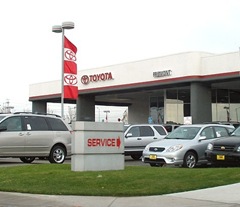The Consumerist headlined a post the other day It Could Take Years For Some Fuel-Efficient Cars To Be Worth The Savings On Gas. The title was enough to annoy me.
It seems that some car makers produce higher MPG versions of their already fairly fuel-efficient offerings. And, of course, these special versions are a bit more expensive. Assuming that all a consumer is interested in is money (and not greenness) the question is whether or not that additional cost is justified by the savings on gas.
And there is an accepted and well justified right way to answer that question and others like it. Basically, and I will get to details in a moment, you consider the extra cost as a potential investment with a projected return and compare that to other investments you might otherwise make with the money.
Read more »
Recently I mentioned, almost in passing, a SmartMoney item that alleged that relatively young used cars were no longer the bargain they once were and that in some cases a new car is actually cheaper. This inspired considerable commentary, much of it of  the thoughtful and fact-based variety.
the thoughtful and fact-based variety.
The relative prices of new and barely used cars is a bit more significant an issue than it may at first appear. Conventional wisdom, which until recently I shared with some certainty, is that new cars depreciate violently the moment they become used ones. The consensus seems to be that they lose something like 30% of their new value.
That sort of instant depreciation underlies the argument that used is, in general, a better deal because people place an irrational premium on the new status of cars and attach an irrational stigma to used ones. If the instant loss of value turns out to be untrue, if it turns out that young used cars are only a little cheaper, then perhaps the larger argument that used cars are the smart way to go stops making so much sense.
Read more »
My basic advice on cars is that you should buy them mildly used, two to four years old, and drive them until they are inert heaps of rust. This is based on the commonplace observation that used cars are generally a better deal for buyers, that is, that relative to new ones they are cheaper than really makes sense.
buyers, that is, that relative to new ones they are cheaper than really makes sense.
Whether this disconnect between new and used car prices is because consumers irrationally prefer new ones or irrationally fear used ones is a metaphysical question I am not going to answer. But the gap is there, and many personal finance types will advise you to buy used rather than new because of it. I don’t disagree, but there is an equally important second principle to be drawn from the new/used price anomaly. Besides “never buy new” there is “never sell used.”
We can all probably agree that buying a car new and selling it used two or three years later is just about the most wasteful way you can own wheels. But buying it as a three year-old and selling it at six is not that far behind. You capture the used car discount when you buy, only to give most of it back again when you sell.
Read more »
Here at the Curmudgeon house, there is no question which was the funniest Super Bowl commercial. It was the ad for the local Toyota dealerships. I think what they had in mind was drumming up traffic for their Washington’s Birthday  Sales (a big tradition around here) by quoting from positive car reviews. But what they wound up doing was filling the screen with short phrases in big block letters surrounded with quotation marks.
Sales (a big tradition around here) by quoting from positive car reviews. But what they wound up doing was filling the screen with short phrases in big block letters surrounded with quotation marks.
"The Best"
"Highest Quality"
"Best Resale Value"
Even my 12-year-old understood the quotes in the ironic sense and nearly pulled a muscle falling off the sofa. I’ve been looking around the web for a video to embed, but sadly cannot find one. As of mid-week they were still obliviously running the ad.
Read more »
Imagine that you are in financial distress. You have a mortgage, a car loan, and credit cards, but cannot pay all three. Which gets paid and which gets stiffed?
Obviously, this is a lesser of evils situation, not an ideal one. Not paying any one of them will have negative consequences. Defaulting on the credit cards will likely result in not being able to use them to buy more stuff. And the other two loans are secured, so not paying those bills could result in the loss of your wheels or roof over your head.
two loans are secured, so not paying those bills could result in the loss of your wheels or roof over your head.
You might think that since shelter is so important, the mortgage would be the most likely bill to be paid. And since buying more stuff on the credit cards is less vital to a person in financial trouble, you might assume that credit cards would be the most likely to be defaulted on. Having your cards taken from you would suck, but not as much as having your car taken.
Not so. Last week Wallet Pop ran a post by Lita Epstein that looked at default data for these three types of loan. Credit cards do turn out to be more commonly defaulted on than car loans, but not by as much as you might have assumed. 1.1% of credit cards were 90 days delinquent in the third quarter. 0.81% of car loans were 60 days delinquent.
Read more »




